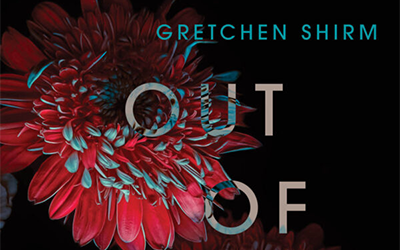
- Free Article: No
- Contents Category: Fiction
- Review Article: Yes
- Article Title: Witness to history
- Article Subtitle: Gretchen Shirm’s vivid new novel
- Online Only: No
- Custom Highlight Text:
‘Here’s what I think: there are neither major nor minor tragedies’, writes the Bosnian poet Semezdin Mehmedinovic. ‘Tragedies exist. Some can be described. There are others for which every heart is too small.’
- Featured Image (400px * 250px):

- Alt Tag (Featured Image): Penny Russell reviews ‘Out of the Woods’ by Gretchen Shirm
- Book 1 Title: Out of the Woods
- Book 1 Biblio: Transit Lounge Publishing, $34.99 pb, 344 pp
- Book 1 Cover Small (400 x 600):

- Book 1 Cover (800 x 1200):

- Book 1 Readings Link: https://www.readings.com.au/product/9781923023314/out-of-the-woods--gretchen-shirm--2025--9781923023314#rac:jokjjzr6ly9m
Jess’s heart does not at first seem ripe for expansion. She governs her life by principles learned in finishing school: be courteous, smile, wear a dress to work. She understands that appearances matter, especially when cameras are trained upon the courtroom every day. She is polite with everyone, intimate with no one; she wears her office attire like an armour and her lacquered hair like a helmet.
We learn, obliquely, that aspects of her childhood and marriage have left her contained, brittle, mistrustful of herself, afraid of her own capacity for feeling. Absorbed with the aftermath of her own divorce, she barely noticed the events of 1995; now, she has everything to learn about the Bosnian war. As she listens daily to horrific accounts of the Srebrenica massacre, her wayward sympathies are drawn, unsettlingly, to the man who stands accused of genocide.
What she hears daily in the courtroom threatens to destabilise her fragile balance. To manage her emotions, she concentrates fiercely on the strokes and curves of her shorthand, ‘like sutures, holding things together on the page’. Taking down words, thinking about their shapes, makes it easier to endure what she is hearing; words, in their concrete form, are a welcome distraction from the ‘unspeakable things’ that haunt the room.
Jess cannot understand what the witnesses are saying, but she observes the emotion and pain of their utterance before the English words arrive in her headphones in the neutral tones of the translator. As she waits for sounds to be delivered from confusion into understanding, Jess experiences a sense of ‘dislocation and unease’. There is dislocation, too, between the ordered arrangements of the court and the things being spoken about by the witnesses, which are not orderly.
Sometimes she watches K, who is on trial for genocide and crimes against humanity. Watching him as he listens to the testimony, seeing ‘his confusion, his disbelief’, helps her make sense of what is said in court. It also gives her an uneasy feeling of sympathy with him, causing her to doubt his guilt. His face seems at times almost gentle, almost kind. Has a mistake been made?
When words become overwhelming, she concentrates on her own body and its needs, to remind herself of the present, that she is ‘there, there, there’. She smooths a broken nail, fixes her lipstick, yearns for hand cream, flees the court on her lunch break to walk and walk and walk. Memories of her childhood, her marriage, her now-adult son, break the surface of her consciousness, offering both a retreat from the intensity of the trial and a reminder of the terrifying vulnerability of love. She has always known she would give her life to protect Daniel. Now she learns of countless mothers who were deprived of their right to protect, and instead watched helplessly as teenaged sons, too young to be soldiers, were taken away to be killed.
Shirm’s writing is superb as she grapples with a moral question that is all too pertinent today. She is never emotive, never sentimental, never polemical, never sensationalist, never deliberately harrowing. Her third-person narrative stays inside Jess’s head: we are with Jess through every defensive, self-protective ploy, every tentative step towards sensation, every surfacing memory. Jess’s changing consciousness is ours, as she progresses from deflection to recognising that she has become a ‘witness to history’ and feeling that, because of what she has heard, the events of Sarajevo and Srebenica now belong to her too. The words are now inside her; the knowledge will forever lie at the periphery of her awareness, transforming her understanding of her own life.
In the wrong hands, the premise could easily seem trite or overly moralistic. In the wrong hands, the abrupt shift in the later sections of the novel from the lingering intensity of the courtroom to an accelerated trajectory of Jess’s life thereafter could seem jarring, even trivialising. But in Shirm’s assured hands, the shift of focus and pace – even, in one compelling section, a shift of voice – only adds complexity and subtlety. Jess’s personal tragedies are not ‘minor’: they exist. This is her story. Her cautious efforts to break the shell in which she has guarded herself since childhood compel our attention and retain our sympathy.
The atrocities committed in Srebenica seem to be confined to the periphery of this novel. Shirm does not set out to narrate the broad sweep of events but instead gives us snippets of authentic testimony, moments of clarity that point to unspeakable horrors. She dwells not on statistics but on fragmented glimpses of personal pain, from which it is harder to look away. We learn the story of the massacre much as Jess learned it, through a layering of minute, intimate detail filtered by a preoccupation with her own concerns. But after the trial adjourns, Jess finds that ‘the more time that elapsed between herself and the events she had heard about in court, the more vivid they seemed’. Such is the art of this novel that since I finished reading it, I have felt much the same way.


Comments powered by CComment